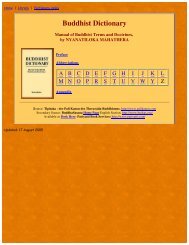Night and Morning with Bhikkhu Tissa
Night and Morning with Bhikkhu Tissa
Night and Morning with Bhikkhu Tissa
- No tags were found...
Create successful ePaper yourself
Turn your PDF publications into a flip-book with our unique Google optimized e-Paper software.
Gene: Ah, well, that’s true, venerable sir. I should. And I wasn’t really expecting the dragonfly to comeback just on my account. Anyway, I was thinking over what you had told me, <strong>and</strong> while I sat there <strong>with</strong>outany particular inspiration or symbol in front of me, I remembered you had said that things arise fromconditions. So I knew I had to get busy <strong>and</strong> make do <strong>with</strong> what I had around me in the world—to producegood supports or conditions. And then, venerable sir, I realized that I had neglected to ask you specificallyhow to get rid of suffering <strong>and</strong> acquire blessings <strong>and</strong> strive for enlightenment. So I went to my books, becauseyou said I should “study the map.”<strong>Bhikkhu</strong> <strong>Tissa</strong>: That’s good. When you have momentum, make use of it.Gene: I did some reading, <strong>and</strong> later in the evening I spent a while meditating, sitting on the rug in myliving room. I felt calmer, as if I were starting to find the right direction. But still a lot of questions came up.Then this morning, for some reason, I woke up early, <strong>and</strong> I thought I should try to carry on that momentum Ihad. So I took off on this detour, <strong>Bhikkhu</strong> <strong>Tissa</strong>—<strong>and</strong> I’ve brought my questions along!<strong>Bhikkhu</strong> <strong>Tissa</strong> (smiling): All right, then, what’s on your mind?Gene: You said I should remember that the Buddha teaches both suffering <strong>and</strong> the ending of suffering.Now, this ending of suffering is Nibbána. That’s the third Noble Truth. But Nibbána seems to be describedoften in negative terms. I know what it’s not—it’s not a heavenly world that one lives in, <strong>and</strong> it’s notannihilation of a self. But what is it, actually?<strong>Bhikkhu</strong> <strong>Tissa</strong>: Nibbána is so beyond worldly experience that worldly concepts cannot contain it;language cannot describe it except indirectly. For example, could you describe the taste of salt to someone whohad never known it?Gene: That would be very difficult—probably impossible.<strong>Bhikkhu</strong> <strong>Tissa</strong>: You might say it’s not sweet <strong>and</strong> it’s not sour, but beyond that how far could you go <strong>with</strong>language? The only way really to know the taste of salt is to taste it. Likewise Nibbána is to be realized <strong>and</strong>experienced for oneself.Gene: But Nibbána seems so remote. If it’s an unthinkable something, how do we know it’s worthattaining?<strong>Bhikkhu</strong> <strong>Tissa</strong>: First of all, we have the testimony of the Buddha <strong>and</strong> some of his enlightened disciples.When the Buddha realized Nibbána he knew he had reached the highest; he had finished his heroic journey;he had attained liberation. For the rest of his life he taught so that others might have the chance to experiencethis highest happiness <strong>and</strong> escape the cycle of saísára. Moreover, even in our ignorance we have an intuitionof something greater, don’t we? We are weighed down <strong>with</strong> worries <strong>and</strong> fears <strong>and</strong> all kinds of trouble, but wecan faintly imagine some release from all of this, some liberation <strong>and</strong> peace. This intuition suggests, veryvaguely, the wonder of Nibbána. We would all like to be free from suffering <strong>and</strong> to gain perfect happiness,<strong>and</strong> these are ultimately the same thing, which is Nibbána.Gene: I doubt that most people even know what perfect happiness would be. It seems people think ofhappiness as the fulfillment of their desires.<strong>Bhikkhu</strong> <strong>Tissa</strong>: Desires have no limit; the appetite is endless. Real happiness—perfect happiness—is notthe satisfying of desire but the calming, the abolishing of desire. Now, this is an unusual idea, but it’s notunthinkable, is it?Gene: No. I underst<strong>and</strong> it to some degree. I feel an attraction toward that goal, toward wisdom <strong>and</strong>freedom.<strong>Bhikkhu</strong> <strong>Tissa</strong>: Well, Nibbána is what lies in that direction. And the Buddha teaches that Nibbána can berealized in this life; it is inviting, attractive, <strong>and</strong> comprehensible to the wise. He says that when a man isovercome by greed, hatred, <strong>and</strong> delusion, he aims at his own ruin, the ruin of others, <strong>and</strong> the ruin of both, <strong>and</strong>he suffers pain <strong>and</strong> grief as a result. But if he gives up greed, hatred, <strong>and</strong> delusion, he does not aim at his ownruin or the ruin of others or the ruin of both, <strong>and</strong> he does not suffer pain <strong>and</strong> grief anymore. Insofar as heaccomplishes <strong>and</strong> realizes this destruction of greed, hatred, <strong>and</strong> delusion, so far does he realize Nibbána inthis life. So you see, it is a gradual process—the more we diminish these defilements the closer we approachthe goal.Gene: Well, I can underst<strong>and</strong> that. Then Nibbána is not just something that happens after death?14
















